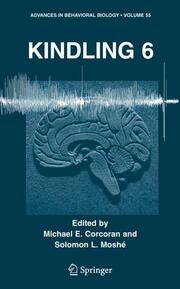Detailansicht
Kindling 6
Advances in Behavioral Biology 55
ISBN/EAN: 9781441937346
Umbreit-Nr.: 1325989
Sprache:
Englisch
Umfang: xiv, 416 S.
Format in cm:
Einband:
kartoniertes Buch
Erschienen am 19.11.2010
Auflage: 1/2005
- Zusatztext
- InhaltsangabeDevelopmental Temporal Lobe Epilepsy in Amygdala Kindled Kittens Prenatal Betamethasone Exposure Suppresses Kindling Epileptogenesis in Immature Rats- Development of Kindling in Immature Fast and Slow Kindling Rats- Neonatal Heat-Induced Convulsions Affect Behaviours in Neonatal, Juvenile and Adult Rats- Experimental Absence Versus Amygdaloid Kindling- Pentylenetetrazol-Induced Kindling As A Model Of Absence and Convulsive Forms of Epilepsy- SoDium Current Properties in Different Models of Epilepsy- Kindling the Gabaergic Penotype of the Glutamatergic Granule Cells- Hippocampal Kindling and GABAB Receptor Functions- Altered Interaction Between the Cortex and Hippocampus in Amygdala Kindled Rats- Nature and Consequences of Seizures Originating in the brainstem- Involvement of the Claustrum and Ventromedial Thalamus in Epileptogenesis- From Ultrastructure to Networks: Kindling- induced changes in Neocortex- Kindling as a Tool for Studying the Role of Subcortical Structures in Limbic Seizures- Kindling, Epilepsy, and the Plasticity of Network Synchronization- General Discussion 1- Electrophysiological and Anatomical Differences, Behavioural Comorbidities and Gene Expression in Fast and Slow Kindling Rat Strains- Gene Expression Changes in Kindling- A Proteomic Approach to the Molecular Analysis of Kindling- Amygdala Metabotropic Glutamate Receptors and kindling- Induction of B1 Bradykinin Receptors in the kindled Brain- Galanin and Kindling- Kindling, Neurotrophins and Axon-Guidance Factors- Conditional Deletion of TRKB Prevents Epileptogenesis in the Kidnling Model- Neuropeptide Y and Its Receptors in Kindling Epileptogenesis- Contribution of PreKindling Affective State to Hemispheric Differences in the Effects on Anxiety of Basolateral amygdala Kindling- Effects of Kindling on Spatial Memory: Characteristics and Mechanisms- A Potential Role for the Hippocampus in The Expression of Kindling-Induced Fear- Does Inadvertent Conditioning Contribute to the Major Features of Kindling?- Contingent Tolerance and Cross Tolerance to Anticonvulsant Effects in Amygdala-Kindled Seizures: Mechanistic and Clinical Implications- Mechanisms of Pharmacoresistance in the Phenytoin-Resistance Kindled Wistar Rat- Development of New Anticonvulsants Using the Kindling Model- Cannabinoids and Kindling- Low Frequency Sine Wage Stimulation Decreases the Incidence of Kindled Seizures- General Discussion 2- Predisposed Susceptibility in Primate Epileptogenesis and Anti-Epileptogenesis- Natural History of Mesial Temporal Lobe Epilepsy With Hippocampal Sclerosis: How Does Kindling Compare with other commonly used animal Models- Clinical Evidence of Epilepsy-Related Plasticity- Pathological Sensitization of the Dopamine System in Experimental Epileptogenesis: Implication for the mechanism of Epileptic Psychosis
- Kurztext
- Kindling is the dominant animal model of epilepsy and the processes underlying the development of epilepsy. Studies of kindling have led to important insights into the mechanisms of epilepsy and potential treatments for seizures and seizure development. These proceedings of the Sixth International Conference on Kindling, held on June 2004 in Victoria, British Columbia, report the results of cutting-edge research on kindling and closely related phenomena. A broad array of themes concerned with research on epilepsy and kindling is covered in the book: Pathogenesis of kindling, including developmental patterns; electrophysiology; anatomy, morphology, and neural circuitry; genes, species, and strains; synaptic pharmacology and neurochemistry Behavioral consequences of kindling Drugs and interventions against kindling Clinical relevance of kindling for our understanding of epilepsy in patients About the Editors: Michael Corcoran is a Professor in the Department of Anatomy and Cell Biology at the College of Medicine at University of Saskatchewan, Saskatchewan, Canada. Solomon L. Moshe is Professor and Vice Chairman of Neurology, Albert Einstein College of Medicine, Bronx, New York.
